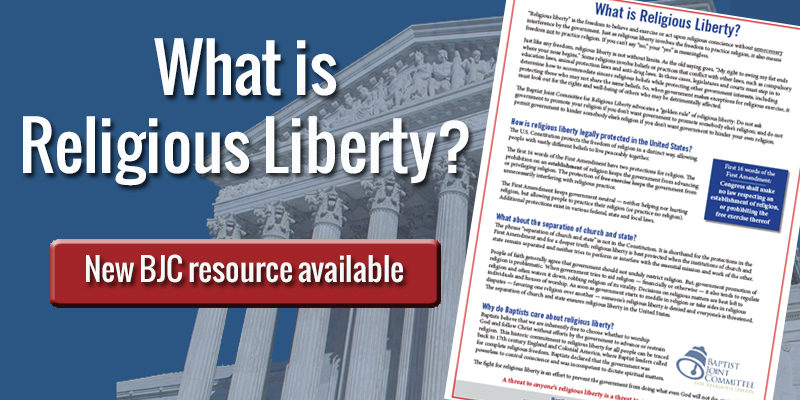A new one-page resource advocates a “golden rule” for religious liberty.
“Do not ask government to promote your religion if you don’t want government to promote somebody else’s religion; and do not permit government to hinder somebody else’s religion if you don’t want government to hinder your own religion,” advocates the free online pamphlet produced by the Baptist Joint Committee for Religious Liberty.
Holly Hollman, BJC general counsel, said the What is Religious Liberty? handout is intended to clear up confusion about a term at the heart of the organization’s work for more than 80 years that being used loosely by the media, presidential candidates and others today.
“Religious liberty is something generally seen as bringing people together,” Hollman said.
Hollman said the resource felt needed now because many people who may not have thought deeply about religious liberty in the past are being bombarded with the term in local controversies popping up around the country.
She said the resource can be used in a variety of ways by both by people already comfortable talking about what religious liberty does and does not mean and to introduce the work of the Baptist Joint Committee to a new audience.
The handout defines religious liberty as the “freedom to believe and exercise or act upon religious conscience without unnecessary interference by the government.”
“Just as religious liberty involves the freedom to practice religion, it also means freedom not to practice religion,” the document says. “If you can’t say ‘no,’ your ‘yes’ is meaningless.”
Like any freedom, the BJC says, religious liberty is not without limits, and in cases where some religious practices conflict with other laws, allowances for religious exercise must take into consideration “the rights and well-being of others who may be detrimentally affected.”
Religious liberty is legally protected in the First Amendment to the U.S. Constitution, the document says, with clauses prohibiting an “establishment” of religion and protecting its “free exercise.” The idea is for the government to remain neutral, “neither helping nor hurting religion, but allowing people to practice their religion.”
While not in the Constitution, the words “separation of church and state” are often used as shorthand for protections in the First Amendment and “for a deeper truth: religious liberty is best protected when the institutions of church and state remain separated and neither tries to perform or interfere with the essential mission and work of the other.”
The handout says Baptists care about religious liberty because they believe “we are inherently free to choose whether to worship God and follow Christ without efforts by the government to advance or restrain religion.”
“This historic commitment to religious liberty for all people can be traced back to 17th century England and Colonial America, where Baptist leaders called for complete religious freedom,” the document says. “Baptists declared that the government was powerless to control conscience and was incompetent to dictate spiritual matters.”
“The fight for religious liberty is an effort to prevent the government from doing what even God will not do: coerce faith,” the handout concludes.
The document can be accessed in printable PDF format at this link.

